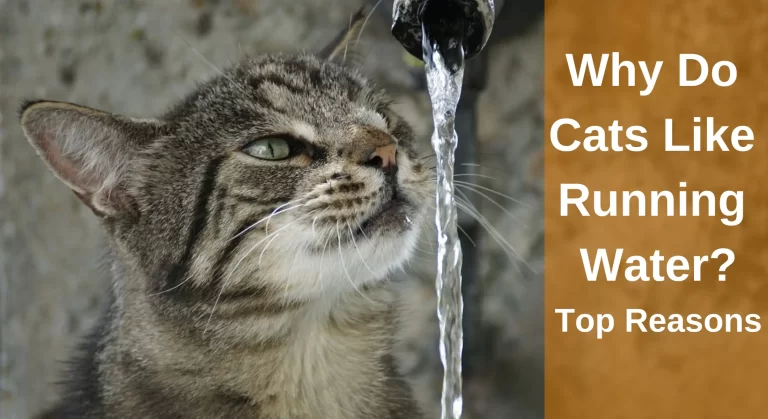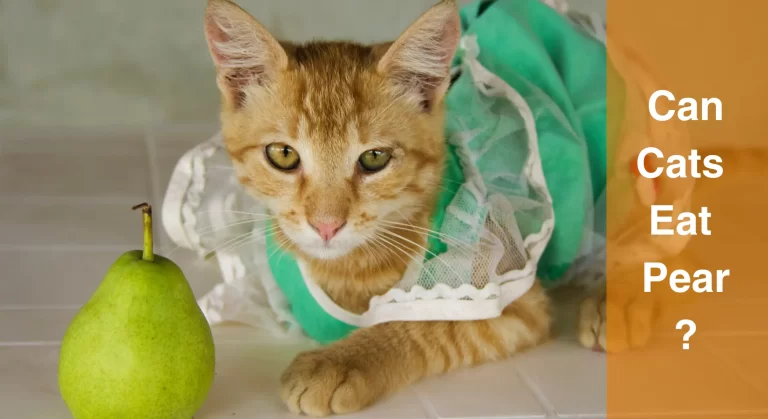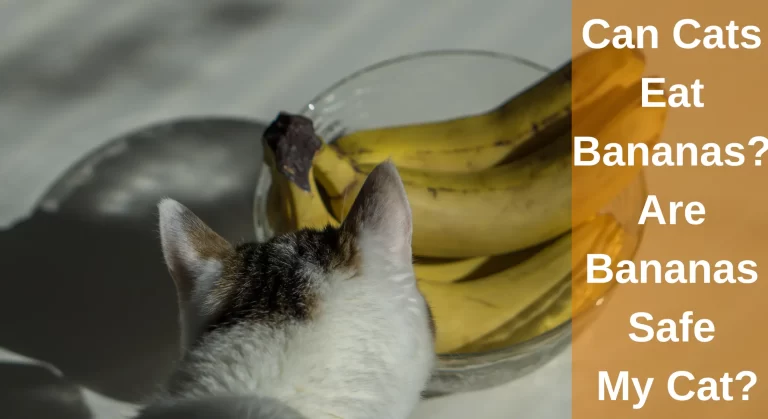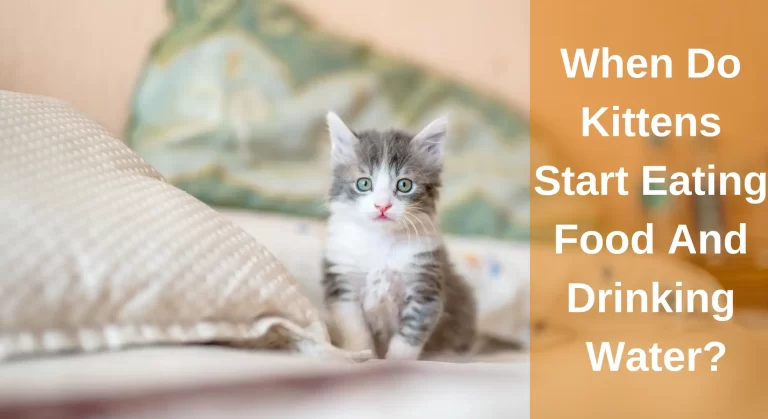Are Marigolds Poisonous To Cats? [Answered]
A beautiful, sunny annual flower, marigolds bring life to your garden. The musky aroma of these flowers makes bugs avoid them. Marigolds are popular among home gardeners for repelling pests.
Before planting a beautiful flower garden, it is essential to proceed with caution if you have a cat. Because several plants are exceedingly poisonous to cats and may even be fatal, even though some plants, flowers, and herbs help promote good soil and a perfect mini-ecosystem. So, are marigolds poisonous to cats?
According to the ASCPA, Marigolds are not toxic to cats and dogs; however, this is particularly true for Pot marigolds. Despite their attractiveness, cats and dogs can suffer digestive issues if they eat too many of these flowers.
We will discuss further which types of marigolds are cat-safe and which are not, their toxicity symptoms and how you can keep your cat safe while having these beautiful flowers in your garden.

Are Marigolds Safe for Cats? Is Marigold Toxic to Cats?
You’ve probably come across conflicting information when searching for information on whether cats can eat marigolds. On some websites, marigolds are listed as toxic to cats, while others are listed as safe for cats to consume.
For example, the ASPCA’s Animal Poison Control Center lists marigolds as nontoxic, while the Cat Fanciers’ Association lists them as poisonous.
Marigold’s toxicity depends on the type of marigold you are studying. The Marigold plant is classified into two types, Pot Marigolds and French Marigolds.
The ASPCA lists the Pot Marigolds(Calendula Officinalis) are safe and non-toxic to cats and dogs.
However, if French marigolds (Tagetes) are consumed in large quantities, they can be mildly toxic to cats. If your cat chews on this type of marigold, she may have skin irritation if she touches it, especially in and around her mouth.
Although this poisoning is often relatively mild, if symptoms last longer than an hour, they must be quickly treated.
Check Out: Are Roses Poisonous to Cats?
Which Type of Marigolds is Safe for Cats?
Cats may safely consume just pot marigolds. Other names of pot marigolds are garden marigolds, ruddles, Mary buds, gold bloom, common marigolds, or Scotch marigolds. Those who enjoy marigolds and have cats might be interested in growing the pot marigold, a beautiful, non-toxic member of the marigold family.
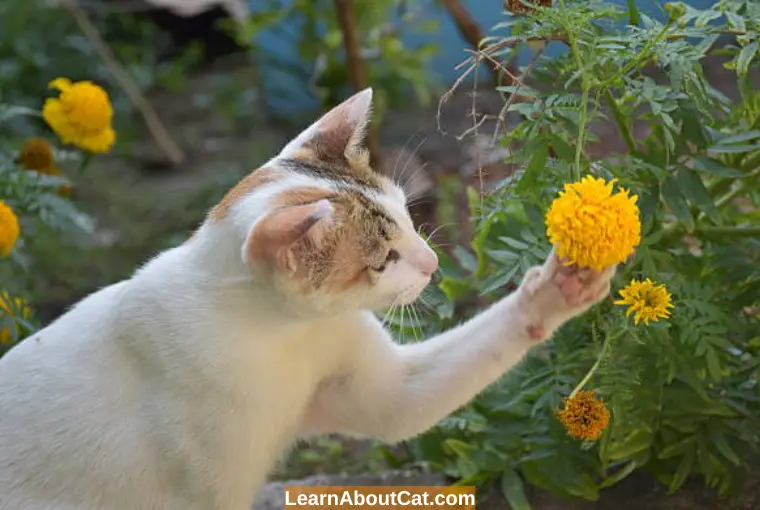
Red Gem, Tangerine Gem and Lemon Gem are edible. These marigolds are an excellent option for a flower garden in your backyard or any location that your dogs or cats frequent.
Calendula (Calendula officinalis), often known as pot marigold, is a well-liked topical anti-inflammatory and antibacterial in herbal therapy, according to VCA Hospitals. Its anti-inflammatory properties and capacity to limit lymphocyte proliferation, a kind of white blood cell linked to the immune system, give it its calming effect.
Also, Check Out: Are Bromeliads Poisonous To Cats?
Symptoms of Marigold Poisoning in Cats?
As you would imagine, if your pets consume too many of these lovely blooms, they will have digestive issues. Additional issues include:

- Excessive drooling
- Diarrhoea
- Vomiting
- Loss of appetite
- Skin irritation
- Redness of skin
- A stomach pain
- Irritation in the mouth, nose, and eye areas.
- Irritation of mucous membranes.
You should watch out for the symptoms above in your cat and seek veterinary advice or expert guidance from an animal poison helpline if you have any reason to believe it may have come into contact with marigold sap or that it has ingested any of the plants which may be evident given that some plant material may be present around their mouth.
Find Out: Is Peperomia Toxic To Cats?
What to Do If Marigold Toxicity Symptoms Appear in Your Cat?

- Give water to your pet to drink over the following 12 to 24 hours first. If the symptoms are mild enough, some veterinarians might advise you to wait it out with your pet companion.
- Make careful to wipe off any remaining sap with warm water and pet-safe shampoo if your dog or cat displays any signs of skin irritation. If your cat dislikes water, you can try a waterless shampoo, although they often work less well in this situation.
- Usually, ingesting these blossoms shouldn’t pose a threat to your pet. However, consuming chemicals like pesticides and fertilisers that were applied to the plants might occasionally result in poisoning. Veterinary fluid therapy may be suggested in certain situations, especially if an animal’s symptoms are severe or last long enough to result in malnutrition or dehydration.
Also Read: Are ZZ Plants Toxic to Cats?
Some Aftercare That a Vet May Recommend
Vets may recommend some fluid treatments to help a cat flush out toxins if their symptoms are severe or prolonged.
When skin irritation gets severe, a vet may prescribe topical creams, although it is extremely rare that Marigolds cause this much difficulty.
Can You Grow Marigolds With Cats?
Pot Marigolds can be grown safely with cats, but toxic varieties such as French or Tagetes Marigolds should not be grown together.

If you have a cat, it is best to grow safe plants and avoid growing potentially toxic ones since it is difficult to know whether your cat will eat potentially toxic plants or not.
Additionally, you should ensure the Marigold plant you purchased is free of pesticides, herbicides, and hormones, which are used to enhance plant growth and beauty but can also be harmful if swallowed by a cat. You should also check whether the Marigold plant is a toxic variety or a non-toxic variety.
Frequently Asked Question
Do marigolds deter cats?
There is no evidence that marigolds deter cats. Cats aren’t bothered by their strong smell, even though they have a strong smell. Cats actually eat marigolds sometimes!
What makes marigolds so unique?
Marigolds are one of the most common flowers to grow in gardens because of how colourful they are and how many helpful insects they will draw in. Marigolds have a reputation for keeping away hazardous nematodes like roundworms.
Its foliage and flowers emit a strong scent that repels most invasive pests, while the roots keep nematodes at bay underneath the ground.
Which plants are edible to cats?
Edible feline flowers are marigolds, zinnias, and Johnny-jump-ups, as well as oat grass, catnip, cat thyme, bean sprouts and rosemary. Even though catnip is known for being a cat favourite, you should first give some to your cat to see whether they like it because not all cats do.
Are marigold leaves toxic to cats?
It is possible that your cat will suffer mild mouth irritation, drooling, stomach pain, and diarrhoea if it eats marigold(Tagetes ) leaves or stems. Skin irritation may also result from contact with the plant’s sap.
Is Mexican marigold poisonous?
There are two common marigold species that are mildly toxic: Mexican marigold (Tagetes erecta) and French marigold (Tagetes patula). Those who come into contact with the sap of the plant may also experience skin, eyes and nose irritation.
Final Words!
Pets who exhibit drooling, skin rashes, vomiting, or diarrhoea may become dehydrated. It is thus essential to watch out for any of these signs and keep a close check on your pets.
Watch out for your cat or dog if they get access to marigolds. Your best approach is to train your pets to stay away from any plants, even when they aren’t thought to be particularly dangerous. By preventing your pets from eating these vibrant blossoms, you can reduce the likelihood that they’ll later devour other, perhaps more harmful, plants.
Related Posts:
Who is Isabella?
My name is Isabella, and I am a dedicated and knowledgeable cat enthusiast. With years of experience caring for cats and a deep love for felines, I made a mission to help other cat lovers navigate the challenges of cat ownership.

